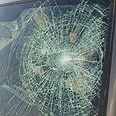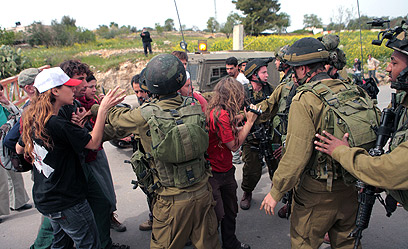
Rock attacks terrorize West Bank drivers
Surge in violent incidents on West Bank highways prompt residents to liken their daily drive to 'game of roulette'
A recent surge of violence in the West Bank has turned many of the roads in the region more dangerous than ever before, with drivers and passengers reporting being attacked by rockets and firebombs on a daily basis.
Most notable is a stretch of Highway 60 that crosses the disputed territory. Only last week three Israelis were injured while traveling down the road, including an IDF officer who required head surgery as result. The latest incident, which left one Israeli lightly hurt, occurred on Monday.
Related stories:
- IDF, PA collaboration in West Bank faltering
- Top official: PM leading Israel to disaster Op-ed: Settlers and human rights
"Driving down the road is like playing roulette," David Brill, a resident of Gush Etzion, told Ynet. "Kids who pass by the road pick up rocks and throw them at you. Some residents avoid driving near the villages, taking long detours instead.
"It's important to understand that these rocks can kill, if not directly then by causing a driver to lose control and crash into oncoming traffic," he added.

Clash in Beit Ummar (Archive photo: Anne Paq/Activestills.org)
The road, which spans from Gush Etzion to Hebron, has long been considered one of the most problematic routes in the area. It passes between two Palestinian villages, Beit Ummar and Al-Arub, whose residents are largely affiliate with Hamas. The army had considered erecting a wall between the villages and the road in order to curb the rock attacks, but the plan was eventually nixed.
The incidents appeared to have subsided a few months ago, only to be started back up again once Israel launched Operation Pillar of Defense in Gaza.
Ofer Ohana, who heads Hatzalah Yosh, an organization that dispatches volunteer emergency crews to help victims, says the villages in the region attract "anarchists" who incite the residents to act violently.
He noted that while the situation has improved since a new brigade commander was assigned to the region, funerals and protests still tend to escalate into riots that result in assaults on vehicles.
"It has become the most dangerous road in the Judea and Samaria region," he said.
An army source said that many resources are being allocated to address the problem.
"We're aware of what's happening on the road," he said. "… We won't resign ourselves to the situation. We will continue to press the rioters to stop."
- Receive Ynetnews updates directly to your desktop










